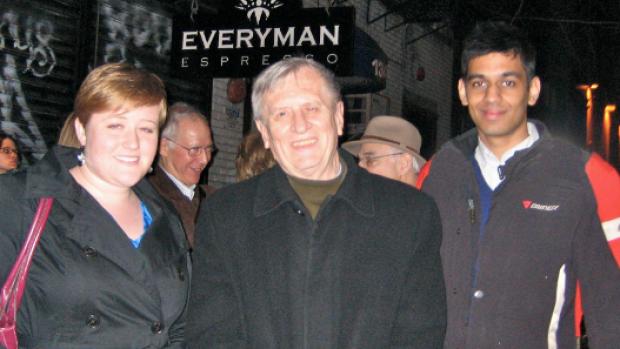Understanding Galileo: Students and Faculty Collaborate to Explore Brecht's Play

This month, students and faculty from NYU's College of Arts and Sciences and NYU-Poly collaborated to consider the legacy of Bertolt Brecht’s play Life of Galileo. In the years around World War II, Brecht, one of the twentieth century’s most innovative playwrights, turned his attention to the scientific revolution. His play considers many important themes, such as scientific orthodoxy, the community of invention, and the purpose of scientific pursuits. In the midst of a fascist uprising, Brecht was also concerned about the role of art in society, so the play is fashioned as part of his “epic theater” that is determined to inspire curiosity in his audience.
On March 5, the Department of Technology, Culture and Society (TCS) in conjunction with the Office of Student Affairs arranged a panel discussion moderated by Romualdas Sviedrys, professor of the history of technology in TCS. Christopher Leslie, academic advisor in TCS and instructor of science, media and technology studies, spoke about Brecht’s concept of epic theater. Jonathan Bain, professor of the philosophy of science in TCS, talked about Galileo and the telescope. From NYU’s College of Arts and Sciences, History Professor Karl Appuhn spoke about the Church and science in the play. Afterward, students and faculty discussed Galileo and his legacy.
Thanks to the generosity of NYU-Poly’s Office of Student Affairs, a group of NYU-Poly and College of Arts and Sciences faculty and students were able to see a performance of the play this past weekend at the Classic Stage Company. One of the students to attend was Marissa Chen (NYU-Poly, Sustainable Urban Environments, 2014), who thought the show was both “hilarious” and “thought-provoking.” It would seem that, for her at least, Brecht’s plan for using familiar subjects for his epic theater worked well: “the story was well known but the show was full of originality.” Christina Arfsten (NYU-Poly, Mechanical Engineering, 2013) said, “I certainly appreciated the message that I think Brecht was trying to get across. It was well written, and well performed.”
Also having a positive reaction was Ankur Vishwakarma (NYU-Poly, BS/MS Mechanical Engineering), who liked that the subject of the play was Galileo, which “elevated it above mere entertainment” so that the evening was relevant academically and culturally. He added, “I would have loved to see a play like this when I was learning about Galileo in Prof. Sviedrys’s Early Modern Science class back in my sophomore year.”
Another student in attendance was Thomas Wrenn (NYU-Poly, Computer Science, 2014), who thought the play was relevant for NYU-Poly students, calling it a “vibrant reminder of, what should be, the ultimate meaning of our efforts, as well as an acknowledgement of the inescapable necessity for pragmatism in opposition to the difficulties of reality.” Brain Kang (NYU College of Arts and Science, Mathematics, class of 2014), thought “the set was wonderful, and the cast’s delivery impressive, despite a few mishaps with lines.”
Professor of Chemical and Biological Sciences Kalle Levon was also at the performance. He was interested to see how the play would depict curiosity and invention. He said he was somewhat disappointed with F. Murray Abraham, who was not able to capture the excitement of the science, even though “Brecht has compiled a good and systematic presentation of the factors affecting the invention, which was one of biggest in human human history.” Professor Levon thought that the conflict between church and science was also lessened; Brecht turned it into “a threat of torture,” and the director played this for laughs while downplaying the actions of the church.




